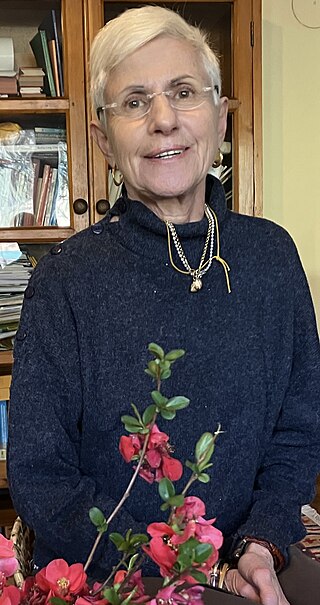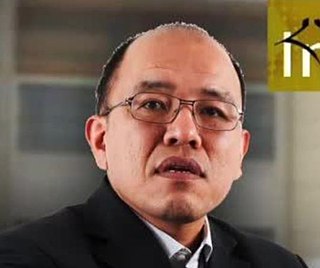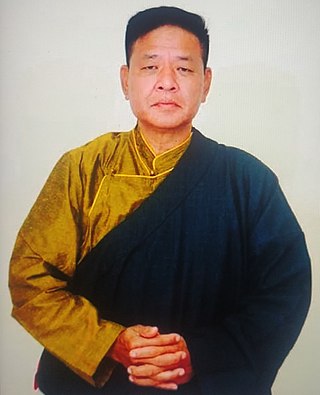Related Research Articles

Alexandra David-Néel was a Belgian–French explorer, spiritualist, Buddhist, anarchist, opera singer, and writer. She is most known for her 1924 visit to Lhasa, Tibet, when it was forbidden to foreigners. David-Néel wrote over 30 books about Eastern religion, philosophy, and her travels, including Magic and Mystery in Tibet, which was published in 1929. Her teachings influenced the beat writers Jack Kerouac and Allen Ginsberg, the popularisers of Eastern philosophy Alan Watts and Ram Dass, and the esotericist Benjamin Creme.

Claude Arpi is French-born author, journalist, and tibetologist born in 1949 in Angoulême who lives in Auroville, India. He is the author of several books including The Fate of Tibet: When Big Insects Eat Small Insects, and several articles on Tibet, China, India and Indo-French relations.
Rolf Alfred Stein was a German-born French Sinologist and Tibetologist. He contributed in particular to the study of the Epic of King Gesar, on which he wrote two books, and the use of Chinese sources in Tibetan history. He was the first scholar to correctly identify the Minyag of Tibetan sources with the Xixia of Chinese sources.
Marcelle Lalou (1890–1967) was a 20th-century French Tibetologist. Her major contribution to Tibetology was the cataloging of the entire Pelliot collection of Old Tibetan manuscripts from Dunhuang at the Bibliothèque nationale de France. In addition to her cataloging work, she wrote articles on various aspects of Old Tibet, and she published a Tibetan textbook. Some of her most notable students include Rolf A. Stein and J. W. de Jong.

Serme Khen Rinpoche Geshe Tashi Tsering BEM is abbot of Sera Mey Monastic University in India. From 1994 to 2018, he was the resident Tibetan Buddhist teacher at Jamyang Buddhist Centre, London.

Ngapoi Ngawang Jigme was a Tibetan senior official who assumed various military and political responsibilities both before and after 1951 in Tibet. He is often known simply as Ngapo in English sources.

Tempa Tsering.

Françoise Pommaret is a French ethno-historian and Tibetologist.

Lodi Gyaltsen Gyari Rinpoche, Kasur Lodi Gyari or "as he is universally known to the Tibetan-speaking world, Gyari Rinpoche" was a Tibetan politician, and journalist who served as the 14th Dalai Lama's special envoy to the United States. Exiled to India in 1959, he was also the executive chairman of the International Campaign for Tibet.

Françoise Robin is a Tibetan-studies professor at Paris' National Institute of Oriental Languages and Civilizations (INALCO), where she specialises in the language, cinema, and literature of Tibet. Robin is currently the general secretary of the International Association for Tibetan Studies.
The Tibet Bureau in Geneva is the official representation of the 14th Dalai Lama and the Tibetan Government in Exile for Central and Eastern Europe. It was established with approval of the Swiss Federal Government in 1964.
Tsewang Dolkar Khangkar is a doctor of traditional Tibetan medicine, currently exiled in India.

Wangpo Tethong is the owner and managing director of Tethong Kommunikation. He is a former party secretary of the Green Party Canton of Zurich, spokesperson of Greenpeace Switzerland and worked as a senior consultant for a Swiss consultancy company. He is also known as a Swiss–Tibetan activist, writer and member of the 15th Tibetan Parliament in Exile.
On February 20, 1964, the second parliamentary election for the Tibetan Parliament in Exile was held. It was the second time Tibetans in exile were able to choose their representatives. Three seats were separated specifically for women as an especial request from the Dalai Lama and the number of representatives was increased from 14 to 17. The four classic schools of Tibetan Buddhism were represented as the three historical regions of Tibet; U-Tsang, Kham and Ando.
Chen Qingying, is a Chinese Tibetologist. He is the director of the History Research Institute under the China Tibetology Research Center.

Lobsang Dolma Khangkar also called Lobsang Dolma or Ama Lobsang Dolma was a 13th generation doctor of traditional Tibetan medicine. She travelled with the Dalai Lama in 1959 from Tibet to India. She was the First woman to become chief physician of the Men-Tsee-Khang. She and the others carried her daughters on their backs into what is now Dharamsala, India: Tsewang Dolkar Khangkar and Pasang Gyalmo Khangkar, succeeded her in the family line of doctors, the Khangkar.
We're No Monks is a 2004 Tibetan drama film, directed and written by Pema Dhondup. The film is produced by Pema Dhondup, Rupin Dang, and Yangchen Dolkar under the banner of Clear Mirror Pictures, and Wilderness Films India Limited. The film stars Tsering Dorjee, Gulshan Grover, and Sonam Phuntsok in the lead roles.

The Central Tibetan Administration, a government-in-exile of Tibet based in India, held an election for its next leader, the Sikyong, in 2021. Candidate Penpa Tsering won the election and succeeded Dr. Lobsang Sangay, who has served for two consecutive terms as Sikyong.

Penpa Tsering is a Tibetan politician based in India. He is the second democratically elected Sikyong of the Central Tibetan Administration in India. He succeeded the last Sikyong Lobsang Sangay on 27 May 2021. Penpa Tsering was the speaker of the Parliament of the Central Tibetan Administration for two terms between 2008 and 2016.
Claude B. Levenson was a French journalist, orientalist, Tibetologist, translator and writer who authored approximately twenty-five books on the subjects of Buddhism, Burma and Tibet. She contributed to the newspapers Le Monde, L'Obs, Politique internationale, Le Temps, Geo, 24 heures and Libération. Levenson was a member of the Committee of 100 for Tibet and worked as a translator for the Dalai Lama.
References
- ↑ Astrid Fossier, Entretien avec M. Wangpo Bashi, secrétaire du Bureau du Tibet en France, avril 2003.
- ↑ Nathalie Gauthard, De l'Administration Centrale Tibétaine au Gouvernement Tibétain en Exil : réformes, limites et paradoxes, p. 139.
- ↑ Braillon, Anne (5 December 2013). "Le Tibet à la médiathèque".
- ↑ Raphaël Liogier, Le bouddhisme mondialisé: Une perspective sociologique sur la globalisation du religieux, p. 275 : "C'est ainsi que la visite de 1993 sera préparée par la FBT en collaboration avec le Bureau du Tibet qui est la représentation politique du Dalaï-Lama en France, et avec des représentants de la communauté tibétaine en exil."
- ↑ Malovic, Dorian (22 March 2013). "Dicki Chhoyang Kalon, au nom de tous les Tibétains". La Croix .
- ↑ Ficatier, Julia (31 July 2008). "Wangpo Bashi, secrétaire du bureau du Tibet à Paris : " La France doit recevoir le dalaï-lama "". La Croix .
- ↑ Anniversaire du Dalaï Lama Archived 9 February 2016 at the Wayback Machine , Fondation Brigitte-Bardot
- ↑ Le Bureau du Tibet de Paris résiste [ permanent dead link ], Parisiens du bout du monde
- ↑ "Bertrand Delanoë reçoit le dalaï-lama". L'Obs. 20 October 2003.
- ↑ "Brève biographie de Madame Kunzang Diki Yuthok". Italian Radicals. 21 March 1997. Archived from the original on 3 March 2016.
- ↑ "His Holiness' Former Representative in South Africa to Hand over Charge". Phayul.com. 17 February 2006.
- ↑ New and Outgoing Representatives meet with Tibetans in France Archived 3 March 2016 at the Wayback Machine , par Tenam, Phayul.com .
- ↑ Fabrice Midal, Un simple moine, p. 217
- ↑ "Monsieur Tsering Dhondup est le nouveau secrétaire du Bureau du Tibet de Paris". World Tibet News . 24 August 2011.
https://tibet.net/namgyal-samdup-takes-on-as-new-coordinator-of-office-of-tibet-paris/